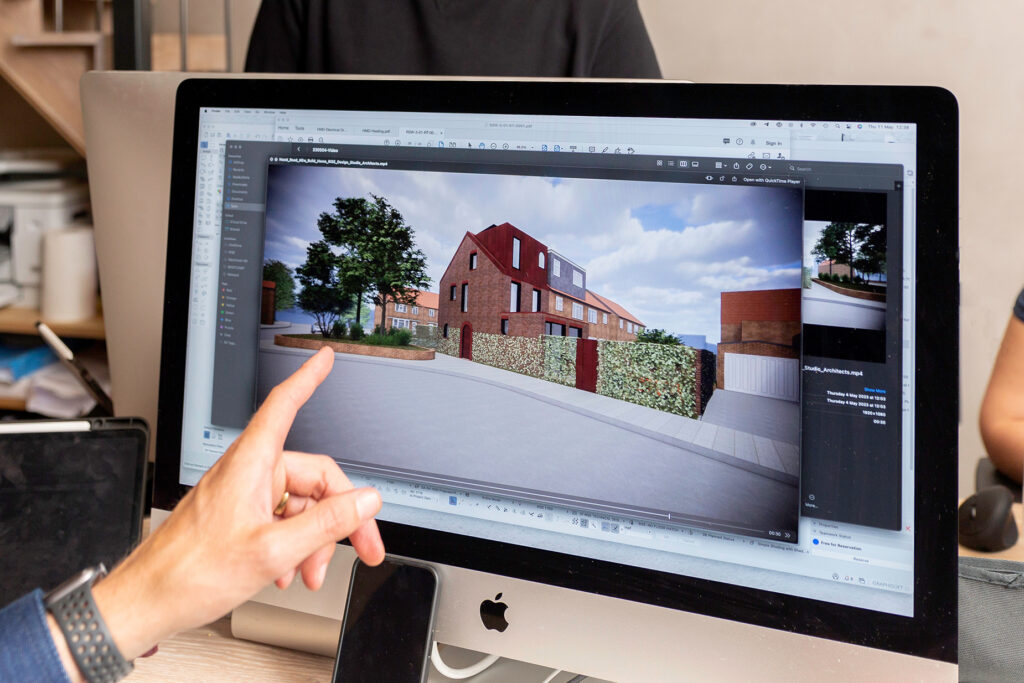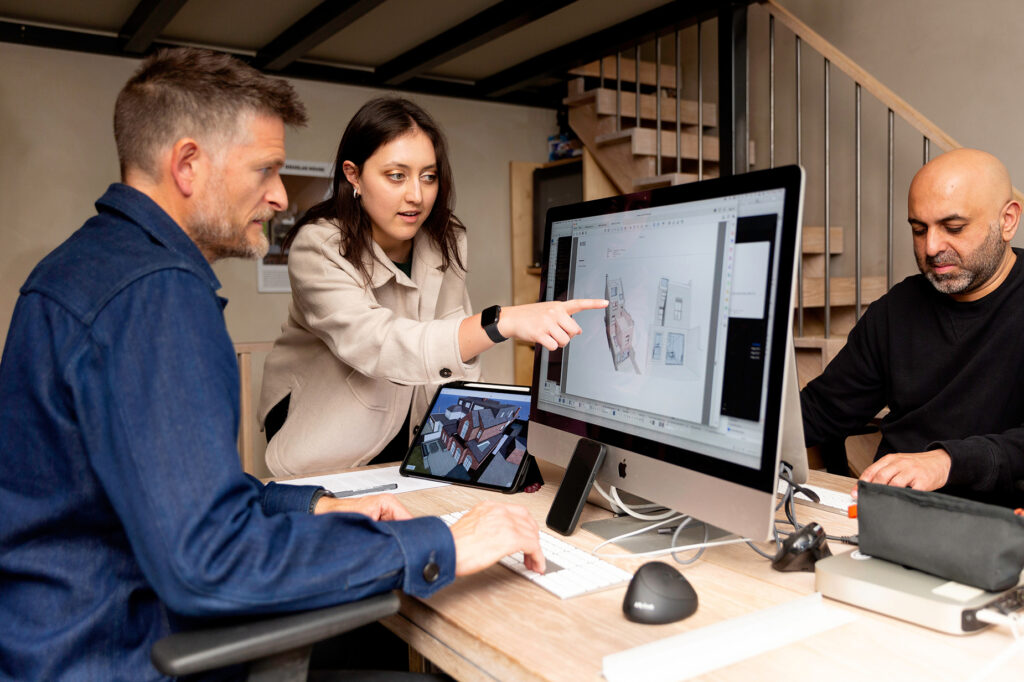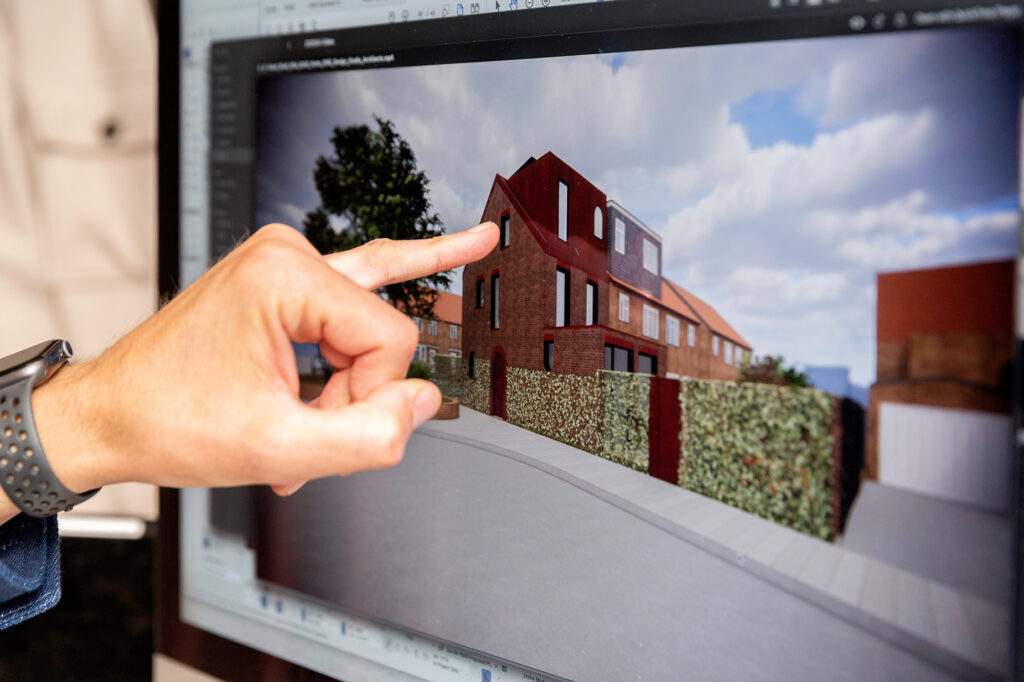When it comes to embarking on a house extension project, one of the first questions that arises is whether or not to hire an architect. Opinions on this matter are often divided, and it usually boils down to budget considerations. Bringing in an additional professional service can increase costs, but it’s important to recognise the value they bring. This guide aims to shed light on the decision-making process, exploring alternative options and explaining the benefits an architect can offer.

The Need for an Architect: Exploring Alternatives
While architects are often the go-to professionals for design services, they are not the only option available. Depending on the scale and complexity of the extension, other routes may be more suitable.
For very small and simple extensions, a builder experienced in this type of work may be capable of providing the design. Alternatively, if you feel confident and have the necessary skills, you could even attempt the design yourself. However, if you have more ambitious ideas, such as glass extensions or unique requirements, involving an architect becomes crucial.
To make an informed decision about whether or not you need an architect, let’s explore the various types of house design professionals and what they can offer.
The Value of an Architect: What They Bring to the Table
When discussing architects, it’s essential to understand their qualifications and expertise. The title “architect” is reserved for professionals who have completed seven years of training and are registered with the Architects Registration Board (ARB). Most architects will also be Chartered Members of the Royal Institute of British Architects (RIBA).
While there’s no legal requirement to involve an architect in your extension project (unlike in some other European countries), there are several compelling reasons to consider hiring one. An architect’s training and experience make them particularly valuable for those new to the world of extensions or dealing with complex criteria and challenging sites.

Here are the benefits an architect can provide for your extension project:
- Design Excellence: Architects possess a unique blend of creativity, technical expertise, and problem-solving skills. They excel at translating a client’s vision into innovative and functional designs that inspire and transform spaces.
- Maximising Existing Space: Architects are trained to assess existing spaces and make the most of them. They can optimise the use of available space in creative and innovative ways, ensuring functionality and efficiency.
- Sustainable Design Approach: In an era where environmental concerns are paramount, architects from sustainably-focussed practices prioritise environmentally responsible design solutions. They integrate energy efficiency, renewable resources, and low embodied carbon principles into their designs, contributing to a sustainable future.
- Plot Maximisation: Architects understand how to make the best use of the plot your house occupies. They consider factors such as orientation, views, and privacy to create designs that harmonise with the site.
- Fresh Ideas and Solutions: Drawing from their training and experience, architects can offer ideas and solutions you may not have considered. Their creative input can elevate your project and provide unique design concepts.
- Knowledge of Construction Methods and Technologies: Architects stay up-to-date with the latest construction methods and technologies. They can incorporate sustainable practices, energy-efficient systems, and innovative building materials into your design.
- Bridging the Gap between Vision and Reality: Architects are skilled at translating your brief into tangible designs. They have the expertise to balance your requirements, budget, and aesthetic preferences to create a design that meets your expectations.
- Industry Connections: Architects have established relationships with reliable builders and tradespeople. They can recommend contractors they have previously worked with, ensuring a smoother collaboration and better project outcomes.
- Compliance and Professionalism: Architects adhere to a statutory code of practice and carry Professional Indemnity Insurance. They are knowledgeable about the planning system, building regulations, and can guide you through the application process.
- Well-being and Sustainability: Architects from design-led practices prioritise occupant well-being and sustainability. They consider factors like natural light, indoor air quality, and biophilic design principles to create spaces that enhance comfort, productivity, health, and happiness.
- Expertise in Low Energy Design: Reducing energy consumption and minimising carbon emissions are crucial in the fight against climate change. Architects from design-led, sustainable practices possess specialised knowledge in low-energy design strategies. They incorporate passive design principles, optimise natural light, ventilation, and thermal insulation, creating energy-efficient buildings that prioritise occupant comfort.
- Attention to Detail and Craftsmanship: Architects are able to dedicate meticulous attention to detail and craftsmanship. They collaborate closely with contractors, and artisans to ensure the design intent is executed with precision, resulting in durable, practical and beautiful buildings.
- Contextual and Community Engagement: Architects appreciate the significance of context and community in architectural design. They undertake thorough site analyses, considering factors such as climate, topography, cultural heritage, and social context. By engaging with the local community and stakeholders, they create buildings that harmonise with their surroundings and reflect the unique identity of the community.
- Recognition and Awards: Architects from award-winning practices have a proven track record of excellence. Their designs are recognised and celebrated for their innovation, sustainability, and contribution to the field of architecture. Engaging with such architects allows clients to benefit from their wealth of experience, expertise, and industry recognition, ensuring that their project stands out and exceeds expectations.
By working with an architect, you benefit from their ability to offer fresh perspectives, transform your vision into reality, and navigate the complexities of design and construction.

Addressing Concerns: Cost and Misalignment
The primary concern for many considering an architect is the cost. Hiring an architect will involve allocating a portion of your budget to the design phase, typically ranging from 5% to 18% of construction costs depending on the level of involvement. However, the value they bring to the project can outweigh the additional expense. Moreover, a skilled architect can help identify cost-saving opportunities and optimise the overall project budget.
Misalignment between the client’s vision and the architect’s design choices is another potential concern. However, this can be mitigated by ensuring clear communication and finding an architect who understands your needs and preferences. By reviewing their previous work and speaking with their previous clients and discussing your expectations upfront, you can find a compatible architect who respects your input.
Flexibility in Service Options and Clarity in Project Requirements
Architects offer various service options, allowing you to tailor their involvement to suit your project’s needs. You don’t necessarily have to opt for a full-service package; instead, you can choose the level of engagement that fits your requirements and budget.
To ensure success, it’s crucial to be clear about your project goals, needs, and budget from the outset. Open and transparent communication with your architect will help them understand your vision and deliver a design that meets your expectations.

Considering the Alternatives
While an architect may be the ideal choice for many extension projects, it’s worth exploring alternative options to find the best fit for your needs.
- Architectural Technologist: An architectural technologist focuses on the design, production, and performance of buildings through the integration of technology. They can provide innovative designs, submit planning applications, coordinate trades, and project manage the extension. It’s important to ensure they have experience and expertise in the type of design you’re seeking.
- Draughts-person: A draughts-person can transform your ideas and sketches into precise plans and technical drawings. While they are generally cheaper than architects, they may lack the same breadth of experience and design innovation.
- Builder: Some builders are capable of producing simple sets of house plans. However, their design capabilities and experience may be limited, so caution is advised unless you have seen their previous work and spoken to past clients.
- Design and Build Firms: Design & Build Contractors handle the design aspect as part of their services as well as the build. This can streamline the process, but it’s essential to ensure their design aligns with your vision and requirements.
- DIY Design: Designing your own extension can save money on design fees, and you have complete control over the outcome. However, it’s important to consider the complexity of the planning process, building regulations, and the need for detailed plans. Software packages can assist in creating professional designs, but thorough research and understanding of regulations are crucial.
Conclusion
When deciding whether or not to involve an architect in your extension project, it’s essential to consider the specific needs and requirements of your project. While an architect brings expertise in design, sustainability, and overall project management, alternative options may be suitable for simpler extensions or budget-conscious clients.
The value an architect (from a sustainably focussed practice) brings lies in their ability to create exceptional designs that inspire and prioritise sustainability, well-being, and craftsmanship. Their expertise in low-energy design, attention to detail, and holistic approach sets them apart, resulting in buildings that leave a positive impact on the environment, occupants, and communities they serve.
Ultimately, the choice of whether to hire an architect for an extension project depends on your budget, project complexity, and the level of creativity and expertise you desire.
If you would like to talk through your project with the team, please do get in touch at mail@risedesignstudio.co.uk or give us a call on 020 3290 1003
RISE Design Studio Architects company reg no: 08129708 VAT no: GB158316403 © RISE Design Studio. Trading since 2011.
